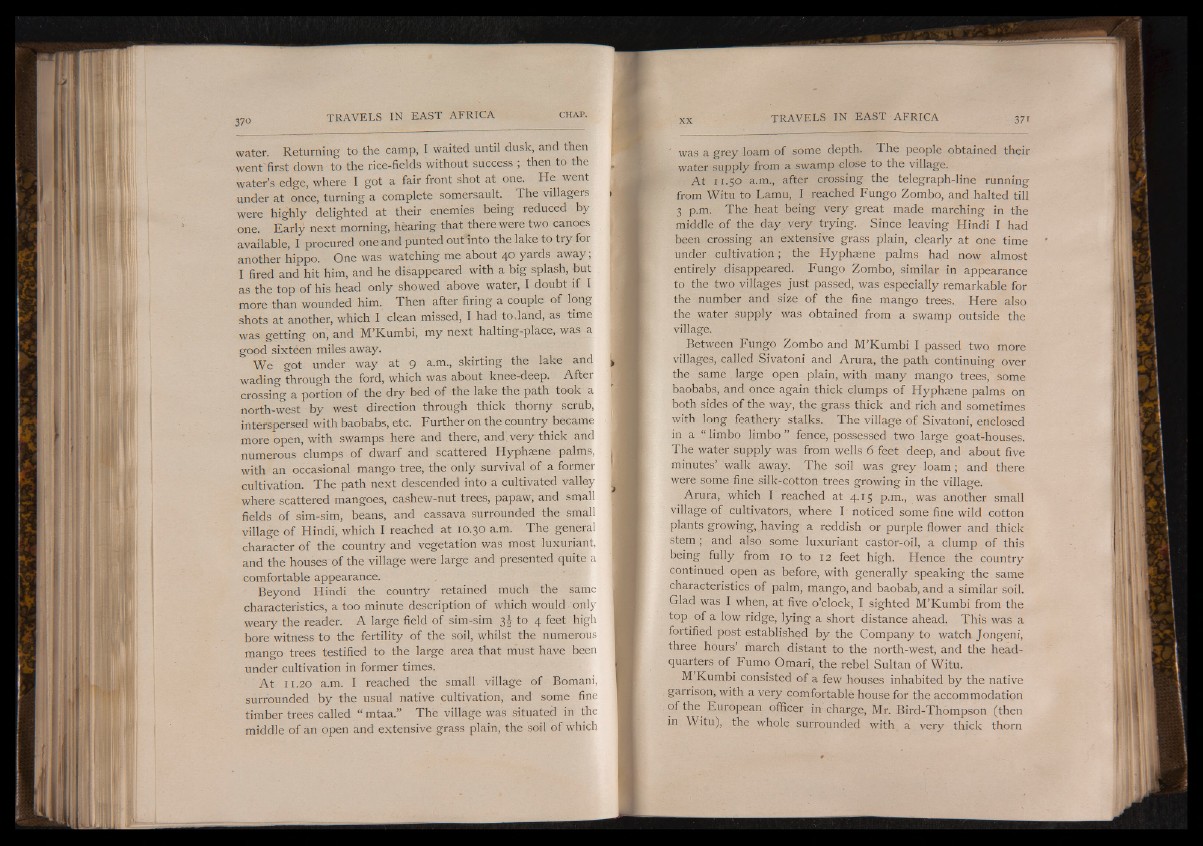
water. Returning to the camp, I waited until dusk, and then
went first down to the rice-fields without success ; then to the
water’s edge, where I got a fair front shot at one. He went
under at once, turning a complete somersault. The villagers
were highly delighted at their enemies being reduced by
one. Early next morning, hearing that there were two canoes
available, I procured one and punted out into the lake to try for
another hippo. One was watching me about 40 yards away;
I fired and hit him, and he disappeared with a big splash, but
as the top of his head only showed above water, I doubt if I
more than wounded him. Then after firing a couple of long
shots at another, which I clean missed, I had todand, as time
was getting on, and M’Kumbi, my next halting-place, was a
good sixteen miles away.
We got under way at 9 a.m., skirting the lake and
wading through the ford, which was about knee-deep. After
crossing a portion of the dry bed of the lake the path took a
north-west by west direction through thick thorny scrub,
interspersed with baobabs, etc. Further on the country became
more open, with swamps here and there, and very thick and
numerous clumps of dwarf and scattered Hyphaene palms,
with an occasional mango tree, the only survival of a former
cultivation. The path next descended into a cultivated valley
where scattered mangoes, cashew-nut trees, papaw, and small
fields of sim-sim, beans, and cassava surrounded the small
village of Hindi, which I reached at 10.30 a.m. The general
character of the country and vegetation was most luxuriant,
and the houses of the village were large and presented quite a
comfortable appearance.
Beyond Hindi the country retained much the same
characteristics, a too minute description of which would only
weary the reader. A large field of sim-sim 3^ to 4 feet high
bore witness to the fertility of the soil, whilst the numerous
mango trees testified to the large area that must have been
under cultivation in former times.
A t 11.20 a.m. I reached the small village of Bomani,
surrounded by the usual native cultivation, and some fine
timber trees called “ mtaa.” The village was situated in the
middle of an open and extensive grass plain, the soil of which
' was a grey loam of some depth. The people obtained their
water supply from a swamp close to the village.
At 11.50 a.m., after crossing the telegraph-line running
from Witu to Lamu, I reached Fungo Zombo, and halted till
3 p.m. The heat being very great made marching in the
middle of the day very trying. Since leaving Hindi I had
been crossing an extensive grass plain, clearly at one time
under cultivation; the Hyphaene palms had now almost
entirely disappeared. Fungo Zombo, similar in appearance
to the two villages just passed, was especially remarkable for
the number and size of the fine mango trees. Here also
the water supply was obtained from a swamp outside the
village.
Between Fungo Zombo and M’Kumbi I passed two more
villages, called Sivatoni and Arura, the path continuing over
the same large open plain, with many mango trees, some
baobabs, and once again thick clumps of Hyphaene palms on
both sides of the way, the grass thick and rich and sometimes
with long feathery stalks. The village of Sivatoni, enclosed
in a “ limbo limbo” fence, possessed two large goat-houses.
The water supply was from wells 6 feet deep, and about five
minutes’ walk away. The soil was grey loam; and there
were some fine silk-cotton trees growing in the village.
Arura, which I reached at 4.15 p.m., was another small
village of cultivators, where I noticed some fine wild cotton
plants growing, having a reddish or purple flower and thick
stem; and also some luxuriant castor-oil, a clump of this
being fully from 10 to 12 feet high. Hence the country
continued open as before, with generally speaking the same
characteristics of palm, mango, and baobab, and a similar soil.
Glad was I when, at five o’clock, I sighted M’Kumbi from the
top of a low ridge, lying a short distance ahead. This was a
fortified post established by the Company to watch Jongeni,
three hours’ march distant to the north-west, and the headquarters
of Fumo Omari, the rebel Sultan of Witu.
M Kumbi consisted of a few houses inhabited by the native
garrison, with a very comfortable house for the accommodation
of the European officer in charge, Mr. Bird-Thompson (then
in Witu), the whole surrounded with a very thick thorn